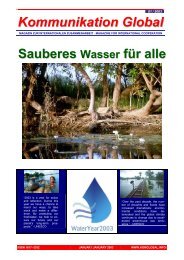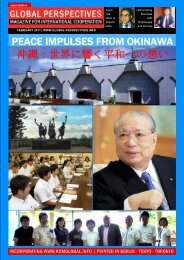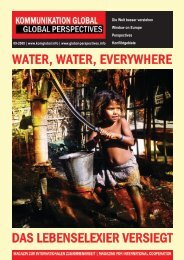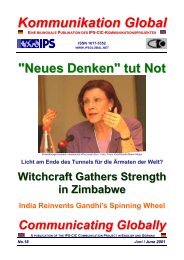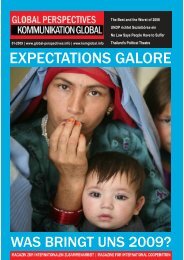GLOBAL PERSPECTIVES | Second Quarterly 2013 â North America ...
GLOBAL PERSPECTIVES | Second Quarterly 2013 â North America ...
GLOBAL PERSPECTIVES | Second Quarterly 2013 â North America ...
Create successful ePaper yourself
Turn your PDF publications into a flip-book with our unique Google optimized e-Paper software.
<strong>GLOBAL</strong> <strong>PERSPECTIVES</strong> - SECOND QUARTERLY <strong>2013</strong><br />
The Oslo conference followed up on a movement to outlaw<br />
nuclear weapons that has been growing since the 2010<br />
review conference of the parties to the NPT. The conference<br />
final document noted "deep concern at the catastrophic<br />
humanitarian consequences of any use of nuclear<br />
weapons" and reaffirmed "the need for all states at all<br />
times to comply with applicable international law, including<br />
international humanitarian law."<br />
This was followed by a resolution by the council of delegates<br />
of the International Red Cross and Red Crescent<br />
Movement in November 2011, strongly appealing to all<br />
states “to pursue in good faith and conclude with urgency<br />
and determination negotiations to prohibit the use of and<br />
completely eliminate nuclear weapons through a legally<br />
binding international agreement.”<br />
Subsequently, at the first session of the preparatory committee<br />
for the 2015 NPT review conference held in May<br />
2012, 16 countries led by Norway and Switzerland issued a<br />
joint statement on the humanitarian dimension of nuclear<br />
disarmament, stating that "it is of great concern that, even<br />
after the end of the Cold War, the threat of nuclear annihilation<br />
remains part of the 21st century international security<br />
environment."<br />
Catastrophic humanitarian consequences<br />
Observers agree that this should initiate serious consideration<br />
of the catastrophic humanitarian consequences of<br />
nuclear weapons, which were highlighted at the Oslo conference:<br />
"In the event of a sudden humanitarian emergency<br />
caused by a nuclear weapon detonation, it is unlikely that<br />
any state or international body has the means to respond<br />
in an adequate manner and be able to provide sufficient<br />
assistance to those affected. Moreover, it might not be possible<br />
to establish such capacity, even if attempts were<br />
made.<br />
"The effects of a nuclear weapon detonation, irrespective of<br />
cause, will not be constrained by national borders, and will<br />
affect states and people in significant ways, regionally as<br />
well as globally."<br />
These and equally atrocious consequences of a possible<br />
human error call for the global civil society to play a pivotal<br />
role in concerted efforts towards ushering in a nuclear<br />
weapons free world, said Kimiaki Kawai, SGI Program Director<br />
for Peace Affairs in a presentation at Palais des Nations<br />
in Geneva on April 26, <strong>2013</strong>.<br />
The consequences of human error have been spelt out by<br />
David Krieger, founder-president of Nuclear Age Peace<br />
Foundation: "While a nuclear war is not likely, it is possible<br />
and could occur by accident, miscalculation or design. Just<br />
as the large-scale radiation releases from the accident at<br />
the Fukushima Daiichi nuclear power plant seemed unlikely<br />
until they occurred, the possibility of nuclear war also<br />
may<br />
David Krieger | Credit: World Future Council<br />
seem unlikely until deterrence fails and it occurs….One<br />
thing we know about humans is that we are fallible. We are<br />
not capable of perfection and we cannot eliminate human<br />
error altogether no matter how diligently we try. Human<br />
fallibility and nuclear weapons are a highly volatile mix."<br />
However Krieger guards against despair. "Despair is a recipe<br />
for giving up but hope is a choice. We can choose hope,"<br />
he said in a presentation at UNOG, and pleaded for "boldness<br />
and hope" with a view to ushering in a nuke-free<br />
world.<br />
Hope, not despair, characterises an overwhelming majority<br />
of the young people surveyed by the SGI youth members.<br />
Nobuyuki Asai, chair of Soka Gakkai Youth Peace Conference<br />
and coordinator of the survey, said: "It is encouraging<br />
that so many youth recognize the inhumane nature of nuclear<br />
weapons. We will continue raising awareness among<br />
youth concerning nuclear weapons and the gravity of the<br />
threat they pose."<br />
*Ramesh Jaura is global editor of IDN and its sister publication<br />
Global Perspectives, chief editor of IPS Germany as<br />
well as editorial board member of Other News. He is also<br />
executive president of Global Cooperation Council, board<br />
member of IPS international and global coordinator of SGI-<br />
IPS project for strengthening public awareness of the need<br />
to abolish nukes. [IDN | April 30, <strong>2013</strong>] <br />
- 37 -








